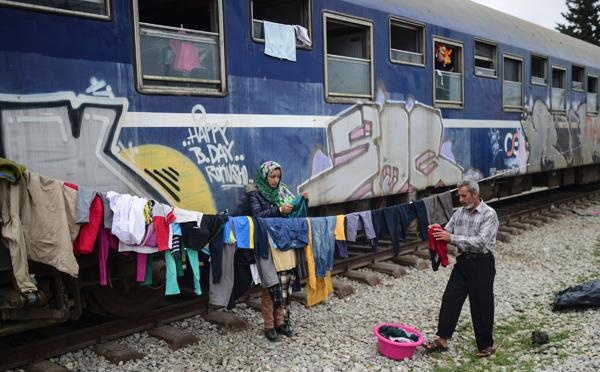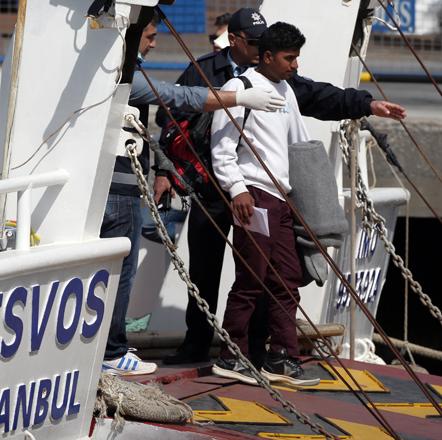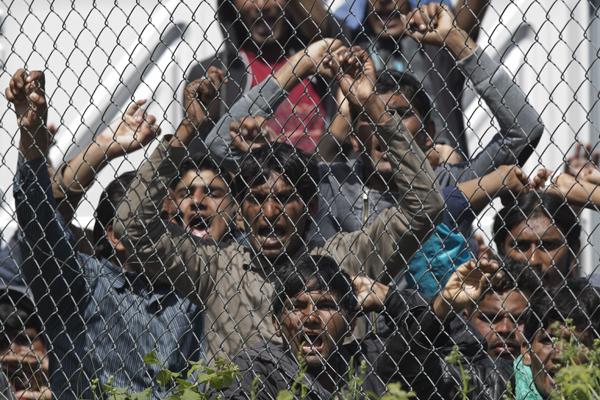You are here
Greece readies to send first migrants back in EU-Turkey deal
By AFP - Apr 02,2016 - Last updated at Apr 02,2016
ATHENS — Greek authorities were gearing up on Saturday to send hundreds of failed asylum-seekers back to Turkey, which is racing to set up reception centres under a controversial EU migrant deal.
"Planning is in progress," Yiorgos Kyritsis, spokesman for Greece's refugee coordination unit, told AFP as Greek state news agency ANA said some 750 migrants would be sent back between Monday and Wednesday, the first wave of deportations under the much-criticised deal.
ANA said the migrants would be sent back from the island of Lesbos to the Turkish port of Dikili, adding that EU border agency Frontex had chartered two Turkish leisure vessels for the operation.
There will be one Frontex agent onboard for every single migrant, ANA said. Kyritsis declined to comment on the report.
On the other side of the Aegean — a sea crossed this year alone by more than 150,000 people searching for a new life in Europe — work is under way on a centre in the Turkish tourist resort of Cesme to host those sent back, the town's mayor Muhittin Dalgic said.
Another readmission centre is being created in Dikili opposite Lesbos, which like neighbouring islands has seen a massive influx of refugees and migrants fleeing conflict and poverty in the Middle East and elsewhere.
Turkish media reports say the Turkish Red Crescent is also preparing to open a refugee camp with capacity for 5,000 people further inland in Manisa to accommodate the new influx.
‘Absolutely’ illegal
Under the deal, all irregular migrants face being sent back from the Greek islands to Turkey — although the deal calls for each case to be examined individually.
For every Syrian refugee sent back, another Syrian refugee will be resettled from Turkey to the EU, with the numbers capped at 72,000.
Turkey and the EU agreed the deal last month as the continent struggles with its worst migration crisis since World War II.
Greek government officials have been tight-lipped on the deal, which has attracted strong criticism on ethical grounds from the United Nations refugee agency and aid groups.
Senior UN migration official Peter Sutherland said on Saturday that the deal was “absolutely” illegal.
“Collective deportations without having regard to the individual rights of those who claim to be refugees are illegal,” he told BBC Radio. “Secondly, their rights have to be absolutely protected where they are deported to — in other words Turkey.”
Amnesty International said last week that Turkey was not a “safe country” for refugees, reporting that Ankara was forcing around a hundred Syrians including children to return to their war-torn country on a daily basis.
Turkey has always vehemently denied that any Syrian is forced to go home.
‘From hell to hell’
“If they make me go back to Turkey I’ll throw myself and my family into the sea,” said Mustafa, a Syrian waiting with his wife and children at the port of Chios Island.
“We went from hell to hell,” he said.
A Greek government source told AFP this week that some 400 Frontex police officers were expected to arrive over the weekend to participate in the operation.
Fifty French riot police were arriving on Lesbos Saturday to help with the operation, Interior Minister Bernard Cazeneuve said, with asylum experts to follow later in this week.
Parallel to this operation, and as part of the same EU-Ankara deal, Turkey — which is hosting some 2.7 million refugees from neighbouring Syria — will on Monday begin sending a first batch of refugees directly to Germany.
German interior ministry spokesman Tobias Plate last week said that most of the arrivals expected Monday would be families with children, putting the number in the “double-digit range”.
Debt-hit Greece has struggled to manage the influx, while hundreds of migrants have drowned trying to reach its islands from Turkey.
Clashes among migrants have broken out at Greek facilities, dissuading those with families from staying there. On Friday, hundreds of migrants walked out of a registration centre on Chios following fresh violence, prompting a leading medical charity to pull out its staff.
Many of them headed to the port hoping to reach ships heading to the Greek mainland, but authorities rerouted the island ferry to another local harbour to prevent unauthorised boardings.
Over 52,000 refugees and migrants seeking to reach northern Europe are already stuck in Greece after Balkan states sealed their borders to stop the influx.
Hundreds more continue to land on the Greek islands on a daily basis despite the EU deal, which was approved by the Greek parliament in a vote Friday.
Related Articles
LESBOS, Greece/CESME, Turkey — There was little sign of preparation on either side of the Aegean less than 24 hours before Greece was due to
DIKILI, Turkey/LESBOS, Greece — The first migrants deported from Greek islands under a disputed EU-Turkey deal were shipped back to Turkey o
ANKARA/LESBOS, Greece — Turkey is ready to take in another 200 migrants deported from the Greek islands this week, a senior government offic














